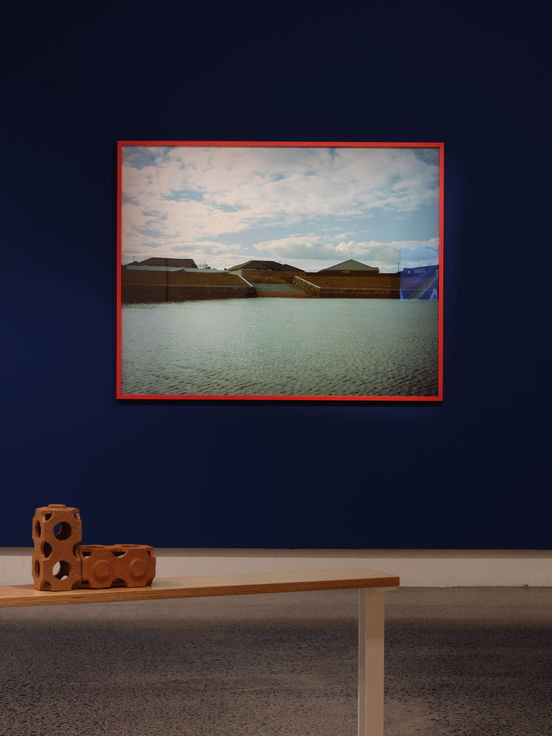Coastal Cannibals draws on Ngahuia Harrison’s ongoing research into the effects of the Marine and Coastal Area (Takutai Moana) Act 2011 upon her iwi, Ngātiwai. This ongoing body of work explores the tension between the rights and responsibilities of stewardship by mana whenua, and the impact of industrial expansion around Whangārei Harbour, Mount Manaia and Marsden Point in Northland.
The Marsden Point oil refinery and Portland cement works have, for more than 50 years, been a key economic driver for the surrounding region and a valuable source of local employment. Situated dominantly within a site of cultural and ecological significance, these industries along with the intensification of urban sprawl, continue to contribute to increased environmental degradation of the Moana and surrounding coastal land, and in some instances attempts to reform it. Residential developments around Ruakākā and Marsden Point have seen the reshaping of the land to channel the Moana, creating canals to enable domesticated boat access for home owners.
Harrison’s practice considers all that the Crown fails to capture within its narrow definition and understanding of how Māori relate to the sea and coastline. She says: ‘For coastal and ocean tribes, the moana is an important and significant place – the ocean is everything. To see it being used in this way is very frustrating – it’s taking and using our land in a way that assumes our interests have been extinguished. They haven’t. Still in our very present and real time of climate crisis it is mind-blowing how little respect there is for land, sea and waterways.’
Harrison’s work is inherently political, yet it is also marked by a loving and careful examination of relationships between people and place, connected through whakapapa.
—
Ngahuia Harrison (Ngātiwai, Ngāpuhi, Ngāti Pukenga) is an artist and researcher based in Tāmaki Makaurau Auckland. She completed her Doctorate of Fine Arts from Elam School of Fine Arts and the James Henare Māori Research Centre, University of Auckland, in 2022. Working with a 4x5 large-format Camera, other lens-based media, Harrison also spends time in archives to source images and information. Harrison’s images explore the tensions of environmental racism, where the needs of conservation are balanced against the need for an income in colonised communities. Harrison is interested in how heavy industry, particularly in and around the Whangārei Harbour, either overshadows or is overshadowed by longer tribal histories and attachment to place.
—
Objectspace at the Sir Miles Warren Gallery is supported by The Warren Trust, Christchurch City Council, Cemac Commercial Interiors, Te Kāhui Whaihanga New Zealand Institute of Architects, Athfield Architects and Karen & Hamish Doig.

Portrait of Ngahuia Harrison by Sam Hartnett

Ngahuia Harrison, Te Whare e tu nei auē karanga mai from the Coastal Cannibals series, 2021







